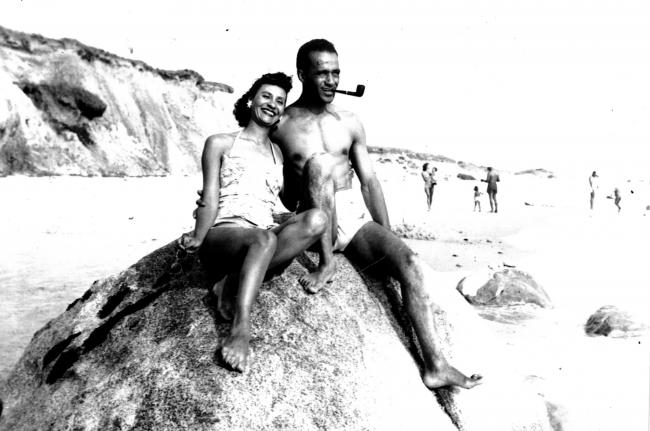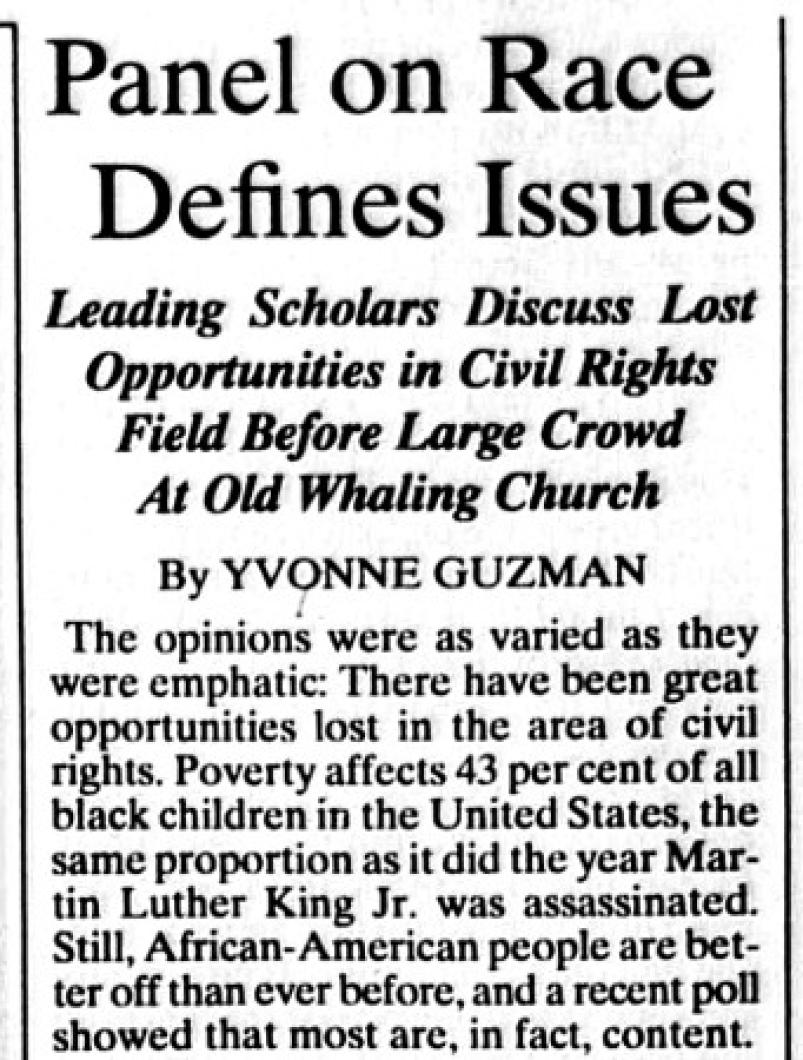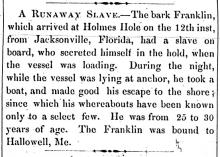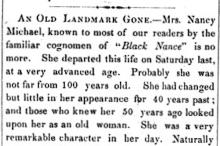The opinions were as varied as they were emphatic: There have been great opportunities lost in the area of civil rights. Poverty affects 43 per cent of all black children in the United States, the same proportion as it did the year Martin Luther King Jr. was assassinated. Still, African-American people are better off than ever before, and a recent poll showed that most are, in fact, content.
All these ideas were debated by participants in a panel discussion Friday night at the Old Whaling Church in Edgartown. The event brought together 10 of the nation’s leading African-American scholars for a freewheeling discussion at which panelists disagreed on many issues -- though they all agreed that their event significantly increased the black population of Edgartown.
The range of opinion stretched from that of Orlando Patterson, a Harvard law professor who said most African-American people are content, to that of Kathleen Cleaver, the former Black Panther who said economic conditions are worse than they were in 1970. In that year, she was able to finance a life for herself as a full-time revolutionary; this year, her son supports himself by selling sandwiches at a Stop ‘n Shop, though he has a degree from Cornell University.
And all cringed at the story told by Patricia J. Williams, who found it was easy to get a low-interest house loan over the telephone, until her bank learned she was black.
“The reason they gave was that property values in that neighborhood had been falling. Demographic data shows that once black people move into a neighborhood, white people start moving out in droves. It’s called a tipping point. Can’t you imagine the neighborhood just tipping right on over like a terrible accident? Oops. All that nice fresh milk spilling out,” the Columbia University law professor said. She said that she has taken to lurking behind her curtains wondering “whether the very appearance of myself will endanger my collateral.”
This was “A Conversation on Race.” Sponsored by Harvard University’s W.E.B. Du Bois Institute for Afro-American Research, the discussion was organized in response to President Clinton’s recent call for a national conversation on race. The vacationing President was invited but did not attend.
His absence did not appear to dampen debate, which lasted three hours. During that time, participants offered sobering statistics: In the first quarter of 1997 half of all black men between 18 and 35 in Washington D.C. were incarcerated, on parole or probation, awaiting trial, or being sought on a death warrant, said Henry Louis (Skip) Gates Jr., the event’s moderator. And they presented distressing visions: The image of a Korean victim of the Los Angeles riots, as portrayed by actor Anna Deveare Smith in an excerpt from her award winning play, Twilight: Los Angeles.
“I wish that I could be together with their people, but after the riot there is too much difference,” she said in a performance preceding the discussion. “The fire is still there. How do you say it? Igniting fire is still there. It can burst out at any time.”
A first topic was about terminology. Though Mr. Clinton didn’t attend, his absence didn’t prevent panelists from wondering aloud what he wants from his proposed national “conversation on race.”
For Cornel West, the author and Harvard professor, the problem of racism is about “suffering and trying to justify suffering,” and the plan should be for action, not conversation.
“How do you have a conversation about suffering?” Mr. West said. “We didn’t have a conversation when Kuwait was invaded. We had a war.”
The national focus ought not to be on conversation but on real hardships facing African-American people.
“You start out with dilapidated housing. You start with inadequate health care. You start with jobs that don’t pay a living wage. You start with people who have been taught to despise themselves and hate themselves and think they’re less than other people as human beings. There’s a whole civilization created around that kind of treatment...This is not cheap PC chit chat,” he said, with a further message aimed at Mr. Clinton: “The budget deal is the conversation on race, in part. Don’t think you can balance the budget on the backs of the working poor and then have a conversation on race on the side.”
Mrs. Cleaver also complained about terminology.
“What disturbs me...is this repetitive nature of the question,” she said, “about what whites prefer to call the race problem. When you hear that word race, you know it means black. Being black is not inherently a problem unless you happen to be caught in a world that is philosophically, materially and historically warped by white supremacy. I wish we would stop using old terms like ‘race relations’ and start using words like ‘white supremacy.’”
Another comment aimed, in part, at Mr. Clinton, came from Randall Kennedy, the Harvard law professor who explained that the law allows police officers to discriminate against African-American people when deciding whether they have cause to search strangers. The justification is that black men are statistically more likely to commit some crimes, so it is legal for an officer to label a black man as a suspect solely on the basis of his race. For Mr. Kennedy the policy puts a “question mark over the heads of people of color across the United States.”
He compared the issue to Patricia Williams story about getting a house loan.
“In all markets, people of color are made to bear an inordinate amount of the risk of doing business,” he said. If public safety is in such jeopardy, he said, “let everybody be randomly searched.”
The panel members had much in common with one another; all were African-American academics and five of the nine panelists were from Harvard, as was the moderator, Mr. Gates.
Still, they represented a wide range of views, and the discussion at times became charged, as it did when Mr. Patterson said the problem of poor black single mothers could be solved if women in unstable circumstances refrained from having children. He said he’s tired of African-Americans being viewed as “people who cannot control their own destinies.”
“Who chooses to have children in single-parent families?” he said. “Are African-Americans predetermined objects who should be viewed always as creatures of circumstances? Can’t African-Americans decide whether they want to have children or not?”
But his comments made some panelists uneasy.
“I don’t think the world works in a model of autonomous choice,” said Harvard professor Christopher Edley, who also is an adviser to Mr. Clinton. “I also don’t think it’s all about class.”
Anita Hill, the former Oklahoma University law professor known for testifying in 1991 against then-Supreme Court nominee Clarence Thomas, also disagreed with Mr. Patterson.
“His idea of self-determinism really translates to African-American women choosing not to become mothers if they are poor,” she said. “I just think that’s a difficult burden to put on African-American women. Secondly, it helps to avoid dealing with the policies that would help those women who decide to have children.”
At times, the audience questioned the goals of the panelists and the value of academic discussion.
One young woman in the audience said it’s now chic to attend events such as the $50-a-head Conversation on Race, and she asked whether intimacy and friendship between individuals of various races will help close the economic gap among the races.
Another audience member asked panelists what their vision is, sparking Mr. Patterson to reject the idea that the nation’s African-American population has one voice or one vision.
“We’re 35 million people, and that’s an undercount. There can be no single vision,” he said.
Mr. Edley disagreed.
“That certainly may be true, but there at least ought to be a few visions,” he said.
The law professor went on to offer his own personal vision of a future in which the differences between the races are not cause for pain. Calling his vision “Episcopalians and Presbyterian,” he sparked laughter.
“I have no idea what the difference is between Episcopalians and Presbyterians,” he said. “I do know that they hang out together on Sunday morning. But we don’t expect the difference between being an Episcopalian and being a Presbyterian to [harm] us on Monday morning when we go into the office.
“To me, the future is not about assimilation. It’s not about giving up any of our identity. It’s about getting to a point where we can celebrate our racial and ethnic differences, but the social and economic significance of those differences is about as important as the difference between Episcopalians and Presbyterians. We notice it, but it doesn’t hurt us.”
In the end, there was no single directive or resolution that came from the forum.
But panelists offered hope that they will make progress. Charles Ogletree, a Harvard law professor, spoke in closing remarks about an event he attended earlier in the day in Oak Bluffs with two African-American artists, writer Dorothy West and singer Jessye Norman.
“As much as you might kind of sense frustration, I think you might be at the wrong end of the evening,” he said. “About five hours ago, I head Jessye Norman sing Every Time I Feel the Spirit. If you could see how she lifted that church up off the ground this afternoon, you’d get the sense that we have made progress.
“I heard Dorothy West talk about...90 years of living, and if she can still be optimistic, I sure think every one of us can. I think we’ve made a lot of progress. I think there’s a lot we need to do. Believe me, those of us at this table are [committed to] this issue, and we won’t let you down.”










Comments